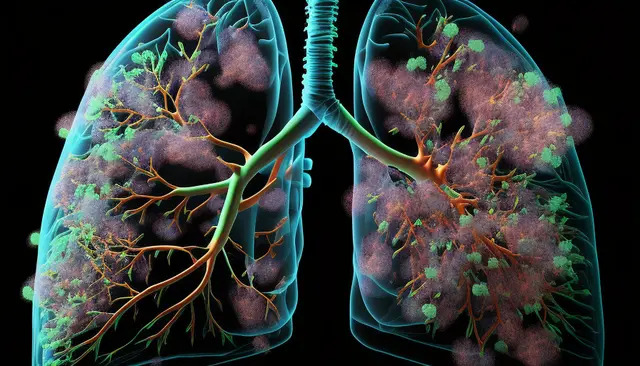Lung illness known as bronchitis frequently follows a cold or flu episode. The primary airways, usually referred to as the bronchi, are made inflamed and irritated by it. Bronchitis is classified into two types: acute and chronic. If you are otherwise healthy and just have acute bronchitis for a few weeks, your lungs will most likely return to normal within a few days. On the other hand, chronic bronchitis is more dangerous. Smoking cigarettes or breathing in filthy air are the usual causes. Ineffective therapy might cause the symptoms of chronic bronchitis to reoccur for months or even years.
What is Bronchitis?
A lung infection called bronchitis affects the airways. These airways are known as bronchi in medicine.
Bronchi branch off either side of the windpipe and lead to smaller airways inside your lungs. Furthermore, the bronchial walls create mucus to capture dust and other particles that could cause inflammation.
When an infection irritates the bronchi, it results in bronchitis, which causes the bronchi to generate more mucus than usual. You will consequently feel the need to cough. Your body is attempting to eliminate the mucus by doing this.
TYPES OF BRONCHITIS
As previously mentioned, there are two varieties of bronchitis:
-
Acute – This is a short-term inflammation that commonly occurs after a bout of the flu or a cold. Symptoms often last a few weeks and go away on their own with no need for medical intervention. Acute bronchitis is more common in the winter and can affect persons of all ages.
- Chronic – You will likely be given the prognosis of chronic bronchitis if you cough on a daily basis for three months out of the year for two years in a row. This type of chronic obstructive pulmonary disease (COPD) is one of the most prevalent types. Adults over 40 are primarily affected, particularly those who smoke.

A “hacking” cough that may produce clear, yellow, grey, or greenish mucus is the primary sign of bronchitis. Additionally, keep an eye out for any additional symptoms that might be related to the common cold. These signs consist of:
-
Tiredness or fatigue.
-
Sore throat.
-
Runny and blocked nose.
-
Aches and pains, particularly in the chest.
-
Headaches.
Because of the constant coughing, you might feel pain in your stomach and chest muscles. You can also have shortness of breath or wheezing when you breathe if you have chronic bronchitis. Even when the rest of your symptoms have subsided in severe cases, your cough may persist for a number of weeks.
Causes of Bronchitis
The viruses that regularly cause colds and the flu also frequently cause bronchitis. But occasionally, bacteria may be to blame.
Bronchitis can be spread by coughs and sneezes just like the cold and flu. When someone with the infection coughs, millions of small droplets of the virus escape through their nose and mouth. These droplets can disperse up to one meter and land on surrounding objects. Anyone person who breaths in these droplets or touches these surfaces runs the risk of contracting an infection.
Contact with hazardous chemicals like smog and tobacco smoke is another cause of bronchitis. The main cause of chronic bronchitis, which can lead to the smoking-related disease emphysema, is smoking.
Additionally, if your job exposes you to grain dust, fabric fibers, or chemical chemicals like chlorine, ammonia, and strong acids, you may get chronic bronchitis. If you operate with any of these materials, be careful to follow the proper safety procedures. When necessary, use dust masks, and whenever you can, take brief breaks outside if possible. Verify that your company is supplying you with the necessary safety gear.
Treatment for Bronchitis
Acute bronchitis is usually treatable without a doctor’s help. They typically go away on their own after a few weeks. Instead, drink plenty of water and rest to help reduce your symptoms and relieve any pain.
Drinking lots of liquids will thin the mucus in your lungs and help you stay hydrated. Paracetamol or ibuprofen can also be used to relieve any aches, fevers, or headaches. Ibuprofen is not suggested for people with asthma, though.
Sadly, there is no known treatment for persistent bronchitis. However, even a few minor lifestyle adjustments can have a big impact on how well your symptoms are managed. It is imperative that smokers immediately stop using tobacco products. If you keep smoking, your symptoms will get worse and may last considerably longer.
We’ll then talk about some easy lifestyle adjustments that can reduce the symptoms of bronchitis.
First off, regular exercise can strengthen all of your muscles, including those involved in breathing. Additionally, it can aid in maintaining a healthy weight. Breathing difficulties brought on by excess weight might exacerbate the signs of bronchitis. Similar to this, maintaining a healthy weight can help you manage your bronchitis symptoms by reducing your bronchitis symptoms.
How To Prevent Bronchitis
One of the most important methods to lower your risk is to stop smoking and restrict your exposure to smokers. The key factor for chronic bronchitis, which can result in emphysema, is the chemicals in cigarette smoke.
Cleanliness is essential. As we all know, common cold and flu viruses can cause bronchitis. In light of this, it’s crucial to constantly wash your hands, especially before handling food or your face. Be mindful of your surroundings. If you discover someone has cold-like symptoms, you should avoid physical contact with them, especially if you have chronic bronchitis.
A Risk of Pneumonia
1 in every 20 episodes of bronchitis will progress to pneumonia. Pneumonia occurs when the tissue in one or both of your lungs swells as a result of a bacterial infection. Therefore, bacterial bronchitis patients are more likely than viral ones to progress to pneumonia. The people who are most at risk of getting pneumonia include:
-
The elderly.
-
Smokers.
-
Those with other conditions such as heart, liver, or kidney disease.
-
Those with weakened immune systems.
Some minor instances of pneumonia can be managed at home with antibiotics. If your condition is more serious, you might require hospital treatment.
Living With Chronic Bronchitis
Chronic bronchitis can create respiratory difficulties, which can be frightening and sometimes fatal. It’s crucial to have a strategy in place for crises because of this. How will you get help if you live alone? What happens if you can’t get to a phone? Personal alarms, thankfully, are a quick and inexpensive fix.
LifeConnect24 provides individual alarm systems that can save lives. Our Emergency Response Team is situated in the UK and is available around-the-clock, every day of the year. Every purchaser receives a pendant button to wear around their wrist or neck. Simply hit the button to request help. Our Response Team will answer the phone and arrange for your designated emergency contacts to arrive and assist you. We’ll also request an ambulance on your behalf if it’s an urgent medical matter.






























